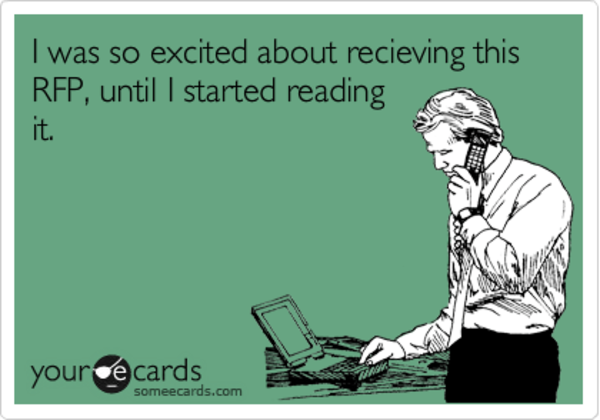A Request for Proposal, RFP, is one of the most common tools an organization uses to find the right partner for a business opportunity.
Finding the right partner for a business opportunity can be complicated. The way an RFP is written makes a big difference. It can help get great work at a competitive price and build a strong relationship.
An RFP includes tangible criteria, such as price, qualifications and experience. But there are other intangible factors such as alignment of organizational values, a shared vision, and organizational capacity.
How do you write an RFP that gets great work? Here 10 top tips.
- ALIGN KEY STAKEHOLDERS EARLY AND OFTEN: An RFP is often either written in isolation or with a laundry list of requirements to make sure everyone’s individual agenda is met. While stakeholder engagement is challenging, don’t begin an RFP without first talking or interviewing key decision makers and aligning their needs into common criteria for selection that is agreed to at the start.
- BEGIN WITH BRIEF OVERVIEW AND OBJECTIVES: State not only what you want the service provider to do but also why: What is the central “pain point” your organization has? For example, if it’s a website redesign, what about the current one isn’t working for your purposes? This is high level, so be brief. The details will come further down and a birds-eye view is fine.
- SET A REALISTIC TIMELINE: Often, there’s a sense of urgency to an RFP which is understandable. However, abrupt deadlines can convey a lack of respect. If your organization faces a serious problem or opportunity, you should budget a serious timeline. But you need the best ideas, counsel and, not necessarily the quickest.
- BE CLEAR ABOUT BUDGETS: It’s important to indicate a commitment by disclosing the funding amount approved. By doing so, you’ll receive much richer and relevant proposals and demonstrate that you are seeking a qualified firm, and are not simply fishing for ideas.
- BE UPFRONT ABOUT NUMBER OF CONTENDERS: The more selective a client organization is in their extending of an RFP, the better indication for the potential partner firm that they’ve has done their homework. If a client hesitates to reveal the number invited or there are more than a handful, it’s possible the organization needs to get a better handle on what exactly it seeks in the RFP process.
- ESTABLISH EVALUATION CRITERIA: Is pricing your only evaluation criteria or are you looking for the best fit and the best project for your budget? State clearly what the participating company is being judged and has to deliver to be selected.
- OPENLY SHARE VITAL BUSINESS INFORMATION: Sharing ample background data and research about your organization conveys that you take the RFP and proposal development process seriously and that you trust your potential future partners with that information. In the end, an open partnership will reap better rewards.
- SKIP THE BUZZWORDS, JARGON AND EXCLAMATION POINTS: As a writer, I’ve learned that when people write like this, it’s often because they are truly eager and excited. This is not a bad thing. However, you need to take a step back. Read your writing aloud. Never write a sentence you couldn’t imagine saying to someone.
- YOU CAN’T KNOW EVERYTHING: And that’s ok! Vendors understand that you cannot know everything and are not able to anticipate every little thing that may come up during the procurement or implementation process. What they do need is for you to lay a good framework by working with your stakeholders, gathering requirements, and layering your information so that it flows and provides insight via text, diagrams, and other visuals. They need to see what you want the product to do, who will use it, and how it will be used.
- REMEMBER YOUR END GOAL: Your end goal is not to simply acquire to pick a vendor. Your end goal is to make sure what results from this process support the change in your organization is seeking – and you receive the best work for a competitive price.
Asking for something that clear and well-written can go a long way to getting great work.
Do this tips help you in writing and RFP? Do they convince you it can lead to great work? Does your company need help writing an RFP?




